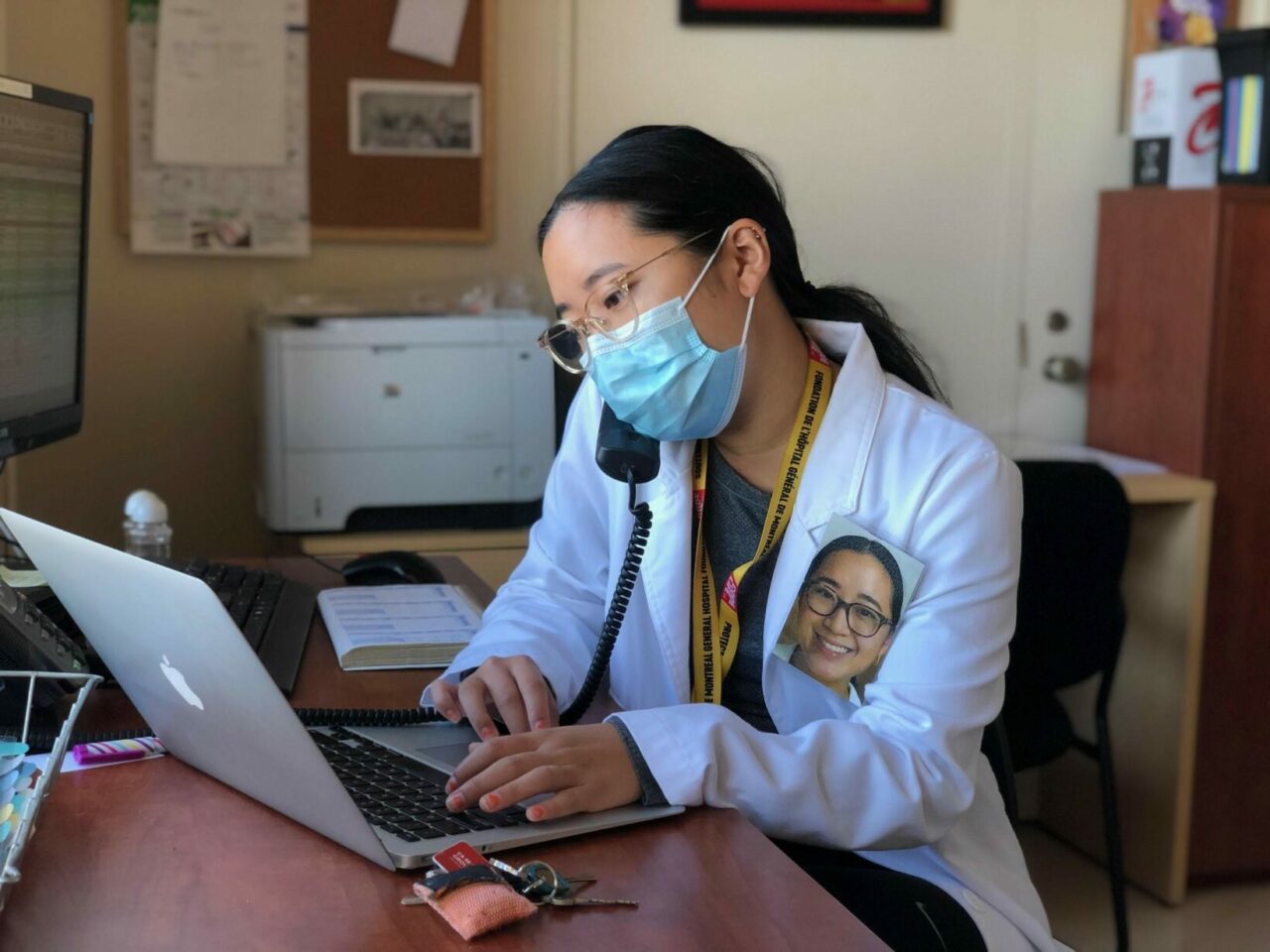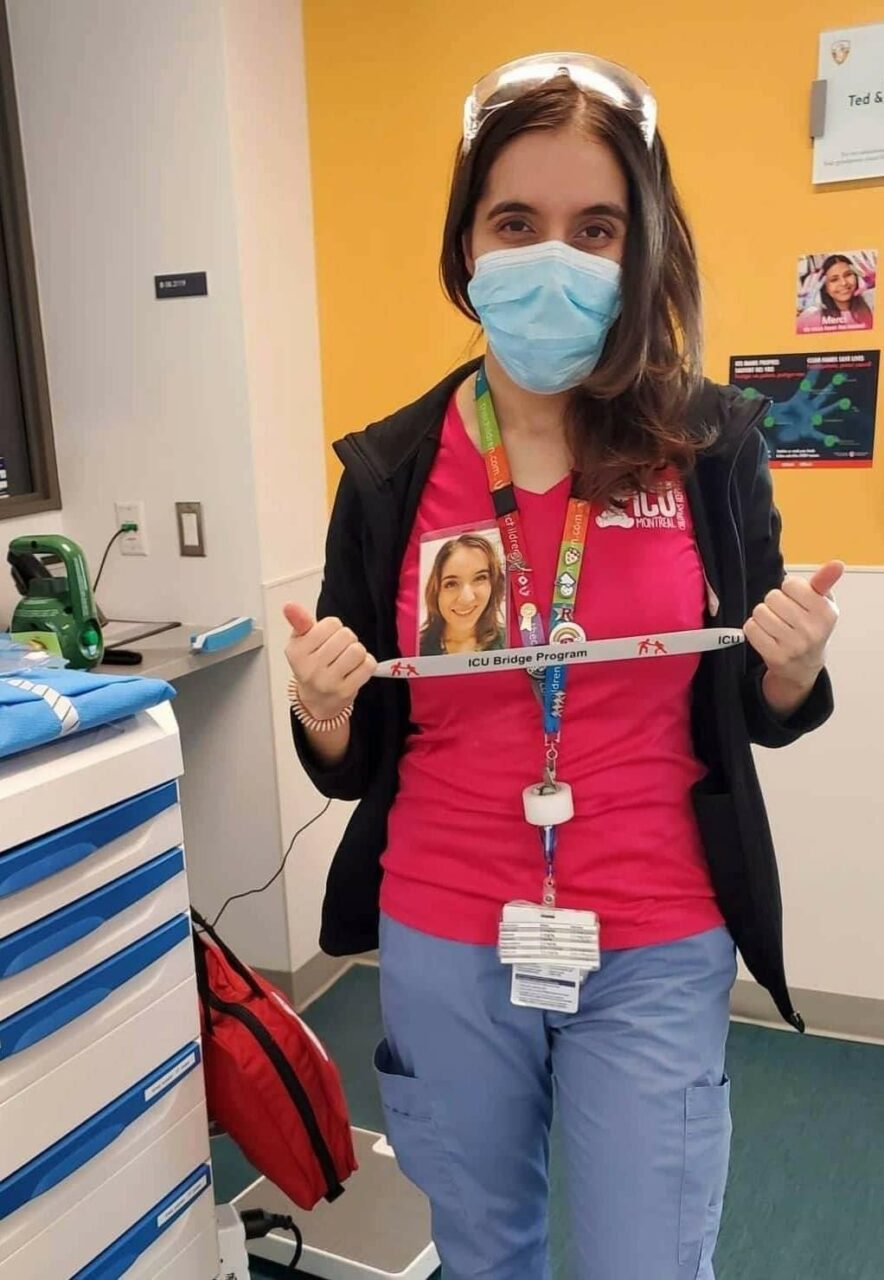
By Erica Sirdevan
Across Canada and around the world, the COVID-19 pandemic continues to induce stress and fear for patients, family members and healthcare workers alike. One measure introduced to hospital protocols has been the requirement of mask-wearing and personal protective equipment (PPE) for all within healthcare centres. The hospital experience – already stressful and uncomfortable for most – became more alienating for patients due to the new physical barriers between them and their healthcare providers.
In April of 2020, members of Montreal’s Intensive Care Unit Bridge Program, decided something must be done to improve the hospital experience. Inspired by Mary Beth Heffernan’s work during the 2014 Ebola epidemic in West Africa, members of the ICU Bridge Program executive team began the process of humanizing the patient experience by providing laminated or disposable headshot portraits worn over PPE that reveal the smiling faces behind the masks. The team consulted Professor Heffernan directly for advice on the project and to this day, they continue to collaborate to optimize each other’s efforts.

PPE, whether it be a simple mask or a full shield, gown and mask, are worn to protect, but consequently create a massive barrier between patients and their caregivers. By wearing a portrait over their PPE gear, healthcare workers’ faces can be seen by their patients to improve connection and comfort. Research shows that patients placed in contact isolation due to their health conditions showed “adverse impacts of isolation on mental well-being, satisfaction, and several measures of patient safety” (Johnson et al., 2020). This project aims to reduce these adverse impacts and promote the warmth and compassion that is beneficial to patient care and experience.
Due to COVID protocols, the PPE Portrait Montreal team had limited access to hospitals and were not permitted to host photobooths. As such, they developed a workflow to minimize the work and help required of healthcare professionals by:
- Collecting pictures of healthcare professionals via an online form http://link.ppeportraits.ca/Canada
- Editing these pictures to focus on their faces.
- Printing these pictures with the help of a local sponsor: the Business Box.
- Delivering these portraits on site with the help of local healthcare professionals and volunteer departments.
The PPE Portraits Project has received tremendous positive feedback from the Montreal community, including a featured video interview on CBC news: https://www.cbc.ca/player/play/1760124483625. With the elderly among the most vulnerable to the COVID-19 pandemic both physically and mentally, it was important to the team to find a way to intervene and improve care with PPE Portraits for caregivers and staff at the facilities where many live. As such, in October of 2020, the team applied and successfully received funding from McGill’s Mary H. Brown Endowment Fund which allowed for expansion into long-term care facilities/CHSLDs across Montreal.
The project would expand beyond Montreal and Quebec to form PPE Portraits Canada via former Intensive Care Unit Bridge Program volunteers and McGill alumni who had gone on to medical school in other Canadian provinces. Today, PPE Portraits Canada has a team of 40+ undergraduate, graduate, and medical students who have received 1500 portrait requests from healthcare professionals in over 50 hospitals and long-term care facilities in 13 cities and four provinces (Nova Scotia, Quebec, Ontario and British Columbia).
The future of the PPE Portraits Canada project looks bright, with the team: continuing to expand the project both within and beyond their current sites, looking into conducting research on the effects of the portraits on healthcare workers and patients, and being invited to create art installations within various exhibits. Beyond the COVID-19 pandemic, the team hopes to make portraits the standard of care whenever PPE is used within healthcare settings.
If you or someone you know would like a PPE Portrait, please fill out the following brief form (should take two to five minutes): http://link.ppeportraits.ca/Canada
To find out more, donate, or contact the PPE Portraits Canada team, visit their website at https://www.ppeportraits.ca/.
February 25, 2021
